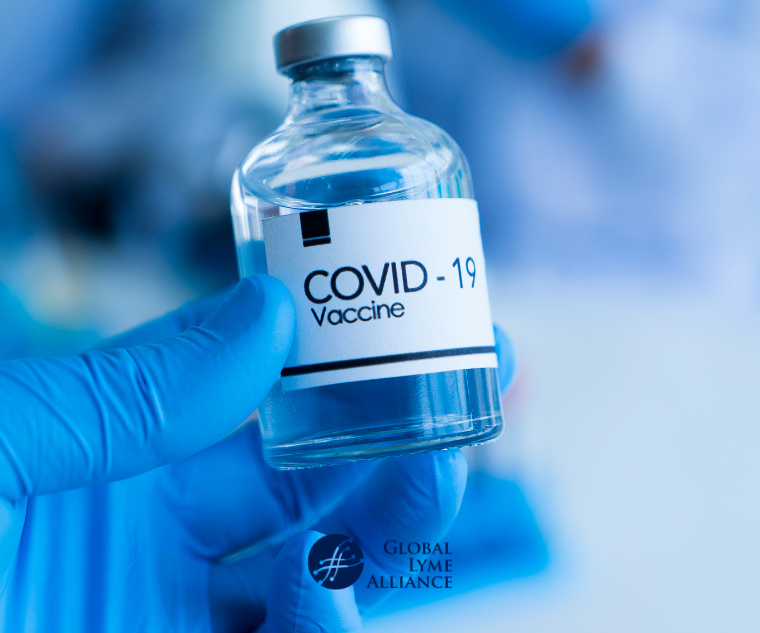
I can’t tell you what to do. I can’t know how I will react to the vaccine. But here’s what I know for sure: I don’t want COVID-19 again, and I wouldn’t wish it on anyone else, either.
In my October “Dear Lyme Warrior…Help!” post, I answered the question everyone was asking at the time: “Should I get a COVID-19 vaccine when it becomes available?” We didn’t yet know how effective a COVID-19 vaccine would be; we didn’t yet know if people like myself who already had COVID-19 would need the vaccine, or if positive antibodies would protect us, and I personally had not yet had a chance to talk to my Lyme Literate Medical Doctor (LLMD) and Primary Care Physician (PCP) about their thoughts.
Now that vaccines are available, many Lyme disease patients have written to see if I have an update. The answer is yes, with the caveat that I am not a medical doctor and cannot give medical advice. Only you and your LLMD can determine what’s best for you. That said, having talked to my doctors and weighed risks and benefits of personally getting vaccinated, I will share my plan (and also give an update on how I am doing post-COVID-19, for those who have been following my “Corona With a Twist of Lyme” posts.
In 2009, I got the H1N1 vaccine. The next day I developed fever, cough, and vomiting. These symptoms lasted for three to four days, and then cleared up entirely. I was worried that the vaccine had given me H1N1, but doctors assured me that can’t happen, just as the COVID-19 vaccine can’t give you COVID-19; neither shot actually contains the virus. My symptoms were a result of an immune overreaction. Lyme patients’ immune systems are hyperactive, and they tend to overreact to threats, or perceived threats. It takes us longer to recover from acute infections. “A little cold” for an otherwise healthy person can turn into a weeks-long sinus infection for a Lyme patient. Immuno-suppression for us means an overactive response.
For this reason, and given my past experience with the H1N1 vaccine, my doctors have recommended against my getting the flu shot. Each year we weigh risk and benefits. We look at my own behaviors and risk of exposure, and consider how my persistent Lyme and babesiosis are doing. Thus far we have determined that the risks of getting the flu shot outweigh the benefits for me personally.
My doctors and I feel differently about the COVID-19 vaccine. My chances of getting COVID-19 are probably higher than my chances of getting the flu, and the results could be far more severe. I certainly don’t want the flu, and I think it would level me for a while if I got it. But my first case of COVID-19 lasted four months. I was infected in early March. My last fever was mid-May. I didn’t stop coughing until the end of June, when I finally got a positive antibody test. Research now shows that those antibodies likely only last three to six months; my coverage has expired.
 Ten months after initially being infected with COVID-19, I’m still wrestling with residual lung inflammation. I take an inhaler twice a day. Sometimes I need to take an additional rescue inhaler after exercising or talking for a long time.
Ten months after initially being infected with COVID-19, I’m still wrestling with residual lung inflammation. I take an inhaler twice a day. Sometimes I need to take an additional rescue inhaler after exercising or talking for a long time.
And I’m one of the lucky ones. I survived COVID-19, and my long-haul effects are manageable. Still, I don’t want to go through this again. I don’t want to get an even worse case. I’d rather have an immune reaction for what I hope will only be a few days than be sick again for four months or longer.
There is risk in getting the shot. I assume my immune reaction will last a few days, but my prediction could be wrong. My reaction could be better than I expect—some healthy people have reported no side effects, while others have reported sore arm, headache, or flu-like symptoms for a couple days—or it could last longer than a few days. That’s a risk I’m willing to take, but it does make me nervous.
My Lyme is currently in remission and my babesiosis flares from time to time. My immune system is stronger than it was in 2009 when I got the H1N1 shot. If I were in an acute phase of Lyme or other tick-borne illness, my doctors might have different advice about the COVID-19 vaccine. Based on analysis of the little data available—there is not yet research on how Lyme patients specifically respond to the COVID-19 vaccine—and consideration of your own risk-benefit factors as well as the current state of your health, your LLMD can help you make the most informed decision possible.
I can’t tell you what to do. I can’t know how I will react to the vaccine (but will write an update once I am able to get the shot; I’m not yet eligible in my state). But here’s what I know for sure: I don’t want COVID-19 again, and I wouldn’t wish it on anyone else, either.
***
For more blog posts, click here.

Jennifer Crystal
Writer
Opinions expressed by contributors are their own. Jennifer Crystal is a writer and educator in Boston. Her work has appeared in local and national publications including Harvard Health Publishing and The Boston Globe. As a GLA columnist for over six years, her work on GLA.org has received mention in publications such as The New Yorker, weatherchannel.com, CQ Researcher, and ProHealth.com. Jennifer is a patient advocate who has dealt with chronic illness, including Lyme and other tick-borne infections. Her memoir, One Tick Stopped the Clock, was published by Legacy Book Press in 2024. Ten percent of proceeds from the book will go to Global Lyme Alliance. Contact her via email below.
